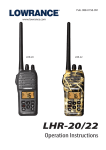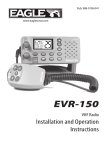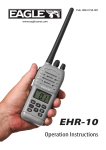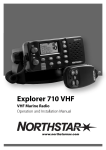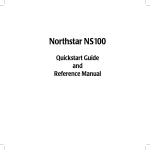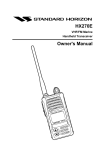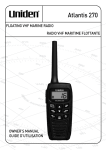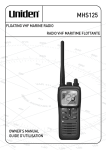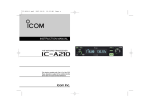Download Eagle EVR-100 Specifications
Transcript
Pub. 988-0158-031 www.eaglesonar.com EVR-100 VHF Radio Operation Instructions Copyright © 2007 Navico All rights reserved. Eagle® is a registered trademark of Navico No part of this manual may be copied, reproduced, republished, transmitted or distributed for any purpose, without prior written consent of Eagle Electronics. Any unauthorized commercial distribution of this manual is strictly prohibited. Eagle Electronics may find it necessary to change or end our policies, regulations, and special offers at any time. We reserve the right to do so without notice. All features and specifications subject to change without notice. All screens in this manual are simulated. On the cover: EVR-100 shown. Other models covered in the manual are similar. For free owner’s manuals and the most current information on this product, its operation and accessories, visit our web site: www.eaglesonar.com Eagle Electronics P.O. Box 669 Catoosa, OK USA 74015 Printed in China. ! CAUTION ! Please read carefully before installation and use. WARNING IMPORTANT SAFETY INFORMATION DANGER ! CAUTION This is the safety alert symbol. It is used to alert you to potential personal injury hazards, Obey all safety messages that follow this symbol to avoidpossible injury or death. !CAUTION WARNING WARNING indicates a potentially hazardous situation which, if not avoided, could result in death or serious injury !DANGER CAUTION CAUTION indicates a potentially hazardous situation which, if not avoided, could result in minor or moderate injury. WARNING CAUTION CAUTION used without the safety alert symbol indicates a potentially hazardous situation which, if not avoided, may result in property damage. ! DANGER Table of Contents Introduction..............................................................................................................................................4 Installation...............................................................................................................................................5 Display.................................................................................................................................................... 11 Basic Operation and Key Functions........................................................................................................... 12 Radio Operation...................................................................................................................................... 14 Turning Your Radio On/Off. . . . . . . . . . . . . . . . . . . . . . . . . . . . . . . . . . . . . . . . . . . . . . . . . . . . . . . . . . . 14 Adjusting Squelch . . . . . . . . . . . . . . . . . . . . . . . . . . . . . . . . . . . . . . . . . . . . . . . . . . . . . . . . . . . . . . . . . . . 14 Selecting High/Low Power . . . . . . . . . . . . . . . . . . . . . . . . . . . . . . . . . . . . . . . . . . . . . . . . . . . . . . . . . . . 14 Selecting Channels . . . . . . . . . . . . . . . . . . . . . . . . . . . . . . . . . . . . . . . . . . . . . . . . . . . . . . . . . . . . . . . . . . 14 Transmitting and Receiving . . . . . . . . . . . . . . . . . . . . . . . . . . . . . . . . . . . . . . . . . . . . . . . . . . . . . . . . . . 14 Scanning Features . . . . . . . . . . . . . . . . . . . . . . . . . . . . . . . . . . . . . . . . . . . . . . . . . . . . . . . . . . . . . . . . . . . 15 Monitor Modes (Dual Watch). . . . . . . . . . . . . . . . . . . . . . . . . . . . . . . . . . . . . . . . . . . . . . . . . . . . . . . . . 15 NOAA Weather Channels. . . . . . . . . . . . . . . . . . . . . . . . . . . . . . . . . . . . . . . . . . . . . . . . . . . . . . . . . . . . . 16 NOAA Weather Alert. . . . . . . . . . . . . . . . . . . . . . . . . . . . . . . . . . . . . . . . . . . . . . . . . . . . . . . . . . . . . . . . . 16 Resetting your Radio . . . . . . . . . . . . . . . . . . . . . . . . . . . . . . . . . . . . . . . . . . . . . . . . . . . . . . . . . . . . . . . . . 16 Appendix A - Technical Specifications....................................................................................................... 17 Appendix B - Troubleshooting.................................................................................................................. 18 Appendix C - Frequency Charts................................................................................................................. 19 International Channel Chart. . . . . . . . . . . . . . . . . . . . . . . . . . . . . . . . . . . . . . . . . . . . . . . . . . . . . . . . . . 19 USA Channel Chart. . . . . . . . . . . . . . . . . . . . . . . . . . . . . . . . . . . . . . . . . . . . . . . . . . . . . . . . . . . . . . . . . . . 21 CANADA Channel Chart. . . . . . . . . . . . . . . . . . . . . . . . . . . . . . . . . . . . . . . . . . . . . . . . . . . . . . . . . . . . . . 23 WEATHER Channels. . . . . . . . . . . . . . . . . . . . . . . . . . . . . . . . . . . . . . . . . . . . . . . . . . . . . . . . . . . . . . . . . . 25 Eagle Warranty........................................................................................................................................ 26 How to Obtain Service . . ......................................................................................................................... 27 EAGLE EVR-100 Operation Instructions 3 Introduction : Congratulations on your purchase of an Eagle EVR-100 marine band VHF radio. Designed for international operation, allows you to transmit and receive on all international channels in the VHF marine band, as assigned by the International Union (ITU). The EVR-100 is approved with commercial-grade standards to give you clear, reliable communication. NOTE: According to WEEE regulations, the user should not dispose the product when damaged, but rather send it back to Eagle for disposal. Refer to How to Obtain Service section for instructions to contact Eagle. Your radio has the following features: l ſ Prominent channel display Keypad and LCD backlighting for easy night-time use l Waterproof and submersible to comply with JIS-7 l Choice of High or Low (7 W or 1 W) transmission power l Top centered PTT button for comfortable left- or right-handed use l Powerful 4 W external audio output l Access to all currently-available marine VHF channel bands (USA, Canada, International) including Weather channels where available l Special CH16/9 key for quick access to the priority (international distress) channel l Special 3CH key to select your three favorite channels l Weather alert facility where available l Squelch Adjustment to help eliminate noise between transmissions l Battery Level - displays the battery voltage l 4 EAGLE EVR-100 Operation Instructions Installation: This Eagle radio allows you to make a maritime distress call to facilitate search and rescue. To be effective as a safety device, this radio must be used only within the geographic range of a shore-based VHF marine Channel 16 distress and safety watch system. The geographic range may vary but under normal conditions is approximately 20 nautical miles. Installation Options There are two ways to install the radio. You can choose: • a deck or overhead mounted gimbal installation. The reversible mounting gimbal is fixed to to a suitable site and the radio is placed into it. The radio can be removed for storage and the viewing angle can be adjusted. • a recessed installation. The radio is recessed into a cavity cut into a bulkhead. The radio fixture is permanent and the viewing angle cannot be adjusted. Location Requirements Please check these BEFORE doing any cutting or drilling. Whichever installation method you choose, ensure that the chosen location: • is at least 3' (1 m) from the antenna • allows easy connection to (at least) a 10 Amp fused 13.6 V DC electrical source and the antenna • is at least 1.5' (45 cms) from the compass to avoid creating magnetic deviation of the compass during radio operation • has a suitable space close by for installing the microphone bulkhead mount • provides easy access to the controls on the front panel • provides reasonable access to the wiring at the back of the radio The VHF has a large LCD screen with an optimum viewing angle of approx. +/-20 deg. Ensure the chosen location provides a suitable view of the display. Ideally, the user should be directly in front of the display or no more than +/-20 deg from the front of the display. Note: If unsure, temporarily power up the radio and check for a suitable location. Side 20˚ 20˚ Top 20˚ 20˚ EAGLE EVR-100 Operation Instructions 5 Checklist The following items should be supplied in the box. Check before starting the installation and contact your dealer if an item is missing. NOTE: An antenna is NOT provided. Consult your Eagle dealer for advice if necessary. 1. 2. Mounting gimbal for the VHF radio Power supply cable with inbuilt 3 Amp fuse 3. External speaker connection cable with white (+) wire and black (-) wire 4. Two mounting knobs 5. Microphone bulkhead mount 6. Four self-tapping screws for the mounting gimbal 7. Four flat screws for the mounting gimbal 8. Four spring washers for the mounting gimbal 9. Four plain washers for the mounting gimbal 10. Four nuts for the mounting gimbal 11. Two self-tapping screws for the microphone bulkhead mount 12. Two flat screws for the microphone bulkhead mount 1 13. Two spring washers for the microphone bulkhead mount 14. Two plain washers for the microphone bulkhead mount 15. Two nuts for the microphone bulkhead mount 16. Two flush-mount brackets for recessed installation 17. Two M5x32 screws for recessedinstallation 18. Two M5x10 screws for recessed installation 19. Two plastic stoppers for the recessed installation (not pictured) 20. Installation template (not pictured) 21. One 3 Amp spare fuse (not pictured) in case of accidental reverse of battery polarity 22. Base unit and microphone (not pictured) 4 5 6 7 8 9 10 2 3 17 & 18 11 12 16 13 14 15 6 EAGLE EVR-100 Operation Instructions Gimbal Installation 1. Hold the mounting gimbal at the chosen location and use a soft pencil to mark the screw hole positions onto the mounting surface. 2. If you can’t reach behind the mounting surface to attach the nuts, use the self-tapping screws instead of the flat screws shown in the picture. If you’re drilling into fiberglass, use a drill bit smaller than 3/16” (5mm) to drill the pilot holes. Otherwise, drill the four screw holes where marked, using a 3/16” (5mm) drill bit. Drill completely through the mounting surface. 3. Use a Philips screwdriver and the set of four flat screws, spring washers, plain washers, and nuts to attach the mounting gimbal to the location site. 4. Slide the radio into the mounting gimbal. 5. Insert the two mounting knobs through the holes and tighten them sufficiently to hold the radio at the desired viewing angle. Change the Viewing Angle The viewing angle on the gimbal mount has a 20º tilt range. To change the current viewing angle on the gimbal mount: 1. Support the radio, then cautiously loosen the mounting knobs until the radio can be moved. 2. Re-position the radio then tighten the mounting knobs again. Recessed Installation 1. Tape the installation template onto the chosen location site. 2. Cut out the area marked by the solid dark line. (The dashed line indicates the total area that will be ed by the radio fascia after installation.) 3. Remove the installation template and slide the radio into the cavity. 4. Working from the rear of the bulkhead, align the racheted outstand on each side of the radio with the central hole in each mounting bracket. EAGLE EVR-100 Operation Instructions 7 5. Use the two short M5x10 screws to screw the mounting brackets to the sides of the radio. 6. Screw each M5x32 screw through the screw hole in the mounting bracket, then attach the stopper. If your bulkhead exceeds 0.51” (13mm), the stopper can be discarded if necessary. 7. Tighten the M5x32 screws until the radio is held firmly against the rear of the bulkhead. Install the Microphone Bulkhead Mount Hold the microphone bulkhead mount at the chosen location and use a soft pencil to mark the screw hole positions on the mounting surface. Ensure that the microphone curly cable will comfortably reach this location BEFORE you drill. 4. Hang the microphone on its mount. 8 EAGLE EVR-100 Operation Instructions MM Use a short length Philips screwdriver and the set of two flat screws, spring washers, plain washers, and nuts to secure the microphone bulkhead mount at the location site. MM Drill the two pilot screw holes where marked. 3. MM 2. MM MM MM 1. Connect the Radio Cables The connectors are on the rear of the base unit, as follows: 1. External Speaker connector. Plug the external speaker cable jack into the connector BEFORE powering on the radio. Use a 4 Ohm 4 Watt external speaker. 2. RED Power wire. Connect this to the POSITIVE (+) battery terminal. Check that a 3 Amp fuse is installed on this power cable close to the battery. 3. BLACK Power wire. Connect this to the NEGATIVE (-) battery terminal. 4. ANT. A radio antenna is not supplied. A suitable radio antenna must be mounted and connected before operating the EVR-100 radio. Consult your dealer for advice if necessary. 5. GND. A ground connection is not usually required. 4 1 2 5 3 EAGLE EVR-100 Operation Instructions 9 The Completed Installation External speaker VHF Antenna External speaker connection cable Antenna connection cable Fuse on RED power cable BLACK power cable Battery Base unit with microphone* * Actual model may differ from that shown 10 EAGLE EVR-100 Operation Instructions Display LCD symbols and Meanings Symbol Meaning Transmitting. TX HI LO Transmission power. High (HI) 7W or Low (LO) 1W. BUSY Receiver busy with an incoming signal. WX Weather channel. WX ALT Weather Alert. Alarm beeps will sound. PRI Priority channel is selected. SCAN Scanning channels. DW Dual Watch mode. ALL ALL channels scan mode. C1 C2 C3 Shows which of the 3 favourite channels, if any, are selected, otherwise blank. (small) (large) Channel selected. UIC Selected Channel bank for VHF radio operations and regulations (USA, International, Canada) Low Battery warning (activates at 10.5V) Channel is temporarily deleted from the ALL SCAN operation. D Indicates a Duplex channel is selected, otherwise, blank for Simplex operation. A B Channel suffix, if applicable. D Duplex operation, otherwise, blank for simplex operation. EAGLE EVR-100 Operation Instructions 11 Basic Operation and Key Functions Key VOL/PWR SQL 16/9 WX UIC 3CH +/- 12 Function Volume and Power. Turn clockwise to power on. Continue to turn until a comfortable volume is reached. VOL/PWR will also adjust the settings of an external speaker, if connected Squelch or Threshold Level. Sets the threshold level for the minimum receiver signal. Turn fully counterclockwise until random noise is heard, then turn slowly clockwise until the random noise disappears. Make another 1/4 turn clockwise for best reception in open sea conditions. Priority Channel. Also on the microphone. Press to cancel all other modes and to tune into the priority channel. Press again to return to your original channel. The default is Channel 16. To make Channel 09 the priority channel, hold down 16/9 until a beep sounds and 09 is displayed. Weather Channel. In USA and Canadian waters, press to hear the most recently selected weather station. The WX symbol is displayed on the LCD. Press + CH - to change to a different weather channel. Press WX again to return to the most recent channel. If the weather alert mode (ALT) is ON and an alert tone of 1050Hz is broadcast from the weather station, it is picked up automatically and the alarm sounds. Press any key to hear the weather alert voice message. Channel Bank. Press to toggle between USA, International or Canadian channel banks. The selected channel bank is displayed on the LCD along with the last used channel. All the channel charts are shown in Appendix. Three Favourite Channels. Also on the microphone. Press to toggle between your favourite channels. The C1, C2, or C3 symbol appears on the LCD to show which favourite channel is selected. EAGLE EVR-100 Operation Instructions SCAN + CH - SKIP H/L PTT To scan only one of your favourite channels, press 3CH then immediately press and release SCAN. If you want to scan all three favourite channels, press 3CH then immediately press and hold SCAN. To add a favourite channel for the first time, select that channel then hold 3CH to store it in the CH1 location. Repeat the procedure to store two more favourite channels in the CH2 and CH3 locations respectively. If you try and add another favourite channel it will overwrite the existing CH1. CH2 and CH3 remain unless you delete them. To delete a favourite channel, select that channel then hold down 3CH until the C1, C2 or C3 symbol disappears on the LCD. Scan. Press to scan between your current channel and the priority channel in DUAL WATCH mode. The weather channel is also scanned if the weather alert mode (ALT) is ON. Hold down SCAN to enter ALL SCAN mode where the priority channel is checked every 1.5 seconds. When a signal is received, scanning stops at that channel and BUSY appears on the screen. If the signal ceases for more than 3 seconds, the scan restarts. Press SKIP to temporarily skip over an “always busy” channel when in ALL SCAN mode and resume the scan. An is shown on the screen to designate a skipped channel. Note that it is not possible to skip over the priority channel. Press SCAN again to stop at the current channel. Channel Select. Also on the microphone. The current channel is shown on the screen in BIG digits with an appropriate designator suffix A or B in small letters below the channel number. Press + CH - to step through the available channels one at a time, or hold down to scroll rapidly through all the available channels. See Appendix for a listing of channel charts. Backlight switch. Press to turn on the backlighting, press again to turn off Battery Level Check. Press to display the battery voltage level. The battery voltage level will be displayed for 5 seconds before returning back to the previous screen. Remove from ALL scan. Press to temporarily remove (SKIP) the channel from ALL SCAN. The channel will be marked with an . Press again to cancel the channel SKIP. Transmission Power. On the microphone ONLY. High (HI) 7W or Low (LO) 1W. Press to toggle between high or low transmission power for the entire channel bank. The HI or LO selection is shown on the LCD. Some channels allow only low power transmissions. Error beeps will sound if the power transmission setting is incorrect. Some channels allow only low power transmissions initially, but can be changed to high power by holding down H/L and PTT at the same time. See Appendix for a complete listing of channel charts. Push To Talk. On the microphone ONLY. Push to start transmitting. EAGLE EVR-100 Operation Instructions 13 Radio Operation Turning Your Radio On/Off Rotate VOL/PWR knob to turn the radio on or off. Rotate to adjust the volume to a comfortable level. Adjusting Squelch Squelch is used to eliminate static and background noise and allows for silent operation of your radio until a transmission is received. If the squelch is too high, only the strongest transmissions can be heard, and when too low, intermittent static and noise are heard. To set Squelch: 1. Turn SQL knob fully counter-clockwise. You will hear a lot of static noise. 2. Then turn SQL knob clockwise slowely until the static noise stops, this is the correct position for the SQL knob. Selecting High/Low Power Press and release the H/L key on the microphone to toggle the transmit power between high and low. When the unit is operating at low power, “Lo” appears on LCD and “Hi” appears on LCD when operating at high power. Some channels allow only low power transmissions. Error beeps will sound if the power transmission setting is incorrect. Some channels allow only low power transmissions initially, but can be changed to high power by holding down H/L and PTT at the same time. See Appendix for a complete listing of channel charts. Selecting Channels To select a channel: Use the + CH - key to find a channel. Stop when you find the desired channel. NOTE: Not all channel numbers are available in INT bands, see marine Channel charts at the back of this manual. Transmitting and Receiving Press and hold the Push-To-Talk (PTT) key to transmit on the selected channel, then release to receive. The TX indicator appears while transmitting. 14 EAGLE EVR-100 Operation Instructions Scanning Features Your radio is equipped with 2 types of scan options: All Scan, 3CH Scan (Favourite Channel Scan). If there are no channels added as favourite channels, the default is All Scan. This function automatically searches for transmissions on the channel being scanned. If a signal is received, the scan stops on the receiving channel as long as it is present and the SCAN indicator flashes. If the signal is lost for 3 seconds, the radio resumes scanning. All Scan Press and hold the SCAN key for 3 seconds to activate the All Scan function. The SCAN and ALL indicator appears on the LCD during All Scan. In All Scan mode, all channels in the channel set are scanned in sequence except the channel set as SKIP channel using SKIP function. After the last channel number has been scanned, the cycle repeats. Press SCAN key again to terminate the SCAN mode. To Skip a channel in ALL scan Press SKIP to temporarily remove (SKIP) the channel from ALL SCAN. The channel will be marked with an . Press again to cancel the channel SKIP. 3CH Scan (Favourite Channels Scan) Press 3CH key when there is at least one favourite channel saved in memory. Press and hold the SCAN key for 3 seconds to start 3CH Scan , the SCAN indicators appear on the LCD. Only the favourite channels and priority channels (CH16) are scanned in sequence. Your radio can store up to three favourite channels. Quick press of the 3CH key will access the stored favourite channels directly (shortcut). To Add Channels to 3CH List During normal operation mode, use the + CH - keys to select the desired channel for programming. Press and hold the 3CH key for 3 seconds. The "C1" icon appears to indicate the current channel has been saved in first favourite channel. Repeat for the second and third favourite channels as C2 and C3 respectively. To Delete Channels from 3CH List Select the favourite channel to be deleted using the + CH - keys, or repeated quick press of the 3CH key. Press and hold the 3CH key until the “Cn” icon disappears. Monitor Modes (Dual Watch) Quick press the SCAN key to activate the Dual Watch mode. The "DW" indicator appears on the LCD. Dual Watch monitors the current working channel and Channel 16 in sequence. WX ALT is also scanned in this mode if set. The watch is halted when activity is detected on a monitored channel. Press SCAN key or PTT to terminate Dual Watch and return to the previous working channel. EAGLE EVR-100 Operation Instructions 15 NOAA Weather Channels To receive a NOAA (National Oceanic and Atmospheric Administration) weather channel, press the WX key. The transceiver will go to the last selected weather channel. Press the + CH - keys to scroll through the available WX channels. To exit from the NOAA weather channels, press the WX key to terminate WX mode and return to the previous working channel, or press 16/9 to access the priority channels. NOAA Weather Alert In the event of extreme weather disturbances, such as storms and hurricanes, the NOAA sends a weather alert accompanied by a 1050 Hz tone and subsequent weather report on one of the NOAA weather channels. When the Weather Alert feature is enabled, your radio is capable of receiving this alert. In the Weather channel, press and hold WX button for 3 seconds to active the Alert function “ALT” will appear on the LCD. To cancel the alert function, Press and hold WX button for 3 seconds again, the “ALT” icon will disappear from the LCD. Note: If Weather Alert mode is selected (WX ALT icon displayed in WX mode), Weather Alert will continue to be monitored even when in normal mode (non-Wx channels) is selected. Resetting your Radio Your radio can be reset to factory defaults. A factory reset clears the following user settings: l ſ favourite channels, l ſ current channel, l ſ channel bank. To perform the reset: 1. Turn the radio OFF. 2. Simultaneously press and hold the SCAN & UIC buttons. 3. Continue to hold the keys until “CC” appears on the LCD. Release the keys to finish the reset process. The LCD switches to CH16 and USA channel bank is selected.. 16 EAGLE EVR-100 Operation Instructions Appendix A - Technical Specifications GENERAL Power Supply: 13.8V DC. Current drain: Transmit 1.5 A at 7 W Tx / 0.6A at 1W Tx Receive Less than 250mA in standby Useable channels: International, USA, Canada, Weather (country specific) Mode: 16K0G3E (FM) PHYSICAL LCD display (viewing): 41(H) x 53(W) mm Backlight control: Yes (On/Off ) Antenna connector: SO-239 (50 ohm) Temperature Range: -17ºC to +50ºC Waterproof: JIS-7 Dimensions: 161(W) x 75(H) x 147(D) mm - without bracket Weight: 0.87kg with microphone Frequency stability: +/- 10ppm Frequency control: PLL GPS/NMEA input: No Comm port: n/a DSC: No FEATURES Flush Mount kit: Yes Local/Distant control: No Position polling: No Group Call: No Channel Naming: No Dual watch, Favourite channel scan, All scan: Yes TRANSMITTER Frequency: 156.025 - 157.425MHz Output power: 7 W / 1 W selectable Transmitter protection: Open / short circuit of antenna Max Freq deviation: +/- 5kHz Spurious & harmonics: better than 2.5µ W Modulation distortion: Less than 4%@ 1kHz for a +/-3kHz deviation RECEIVER Frequency: 156.025 - 163.275 MHz 12dB SINAD sensitivity: 0.25uV 20db SINAD sensitivity: 0.35uV Adjacent CH selectivity: more than 65db Spurious response: more than 65 db Intermodulation Rejection ratio: more than 65 db Residual Noise level: more than -40 db unsquelched Audio output power: 2 W (with 8 ohm at 10% distortion) 4 W with 4 ohm external speaker Compass safe distance: 0.5 m (1.5’) Specifications are subject to change without notice. EAGLE EVR-100 Operation Instructions 17 Appendix B - Troubleshooting 1. The transceiver will not power up. A fuse may have blown OR there is no voltage getting to the transceiver. a) Check the power cable for cuts, breaks, or squashed sections. b) After checking the wiring, replace the 3 Amp fuse (1 spare fuse is supplied). c) Check the battery voltage. This must be greater than 10.5V. 2. The transceiver blows the fuse when the power is switched on. The power wires may have been reversed. a) Check that the red wire is connected to the positive battery terminal, and the black wire is connected to the negative battery terminal. 3. The speaker makes popping or whining noises when the engine is running. Electrical noise may be interfering with the transceiver. a) Re-route the power cables away from the engine. b) Add a noise suppressor to the power cable. c) Use resistive spark plug wires and/or use an alternator whine filter 4. No sound from the external speaker. a) Check that the external speaker cable is physically connected. b) Check the soldering of the external speaker cable. 5. Transmissions are always on low power, even when high (HI) power is selected. The antenna may be faulty. a) Test the transceiver with a different antenna. b) Have the antenna checked out. 6. Battery symbol is displayed. The power supply is too low or too high. a) Check the battery voltage. This should be at least 10.5V ± 0.5V DC. b) Check the alternator on the vessel. 18 EAGLE EVR-100 Operation Instructions Appendix C - Frequency Charts International Channel Chart CH TX RX MODE TRAFFIC TYPE (MHz) (MHz) 01 156.050 160.650 D Public Correspondence 02 156.100 160.700 D Public Correspondence 03 156.150 160.750 D Public Correspondence 04 156.200 160.800 D Port Operations 05 156.250 160.850 D Port Operations, Selected VTS Areas 06 156.300 156.300 S Inter-ship Safety 07 156.350 160.950 D Port Operations 08 156.400 156.400 S Commercial (inter-ship only) 09 156.450 156.450 S Recreational Calling Channel 10 156.500 156.500 S Commercial 11 156.550 156.550 S Commercial, VTS in Selected Areas 12 156.600 156.600 S Port Operations, Selected VTS Areas Inter-ship Navigation Safety (bridge-to bridge) 13 156.650 156.650 S 14 156.700 156.700 S Port Operations, Selected VTS Areas 15 156.750 156.750 S Port Operations 16 156.800 156.800 S International Distress, Safety, and Calling 17 156.850 156.850 S State Controlled 18 156.900 161.500 D Port Operations 19 156.950 161.550 D Commercial 20 157.000 161.600 D Port Operations 21 157.050 161.650 D Port Operations 22 157.100 161.700 D Port Operations 23 157.150 161.750 D Public Correspondence 24 157.200 161.800 D Public Correspondence 25 157.250 161.850 D Public Correspondence 26 157.300 161.900 D Public Correspondence 27 157.350 161.950 D Public Correspondence 28 157.400 162.000 D Public Correspondence 60 156.025 160.625 D Public Correspondence 61 156.075 160.675 D Port Operations 62 156.125 160.725 D Port Operations 63 156.175 160.775 D Port Operations 64 156.225 160.825 D Public Correspondence 65 156.275 160.875 D Port Operations EAGLE EVR-100 Operation Instructions SHIP TO SHIP No No No No No Yes No Yes Yes Yes Yes Yes Yes Yes Yes Yes Yes No No No No No No No No No No No No No No No No No SHIP REMARK TO SHORE Yes Yes Yes Yes Yes No Yes No Yes Yes Yes Yes No Yes 1 1W only Yes Yes 1 1W only Yes Yes Yes Yes Yes Yes Yes Yes Yes Yes Yes Yes Yes Yes Yes Yes Yes Yes 19 66 67 68 69 70 71 72 73 74 77 78 79 80 81 82 83 84 85 86 87 88 156.325 156.375 156.425 156.475 156.525 156.575 156.625 156.675 156.725 156.875 156.925 156.975 157.025 157.075 157.125 157.175 157.225 157.275 157.325 157.375 157.425 160.925 D 156.375 S 156.425 S 156.475 S 156.525 156.575 S 156.625 S 156.675 S 156.725 S 156.875 S 161.525 D 161.575 D 161.625 D 161.675 D 161.725 D 161.775 D 161.825 D 161.875 D 161.925 D 161.975 D 162.025 D Port Operations Commercial, bridge-to-bridge Boat Operations, Recreational Port Operations Digital Selective Calling - DSC Port Operations Inter-ship Port Operations Port Operations Inter-ship Non-Commercial Commercial Commercial Port Operations Port Operations Public Correspondence Public Correspondence Public Correspondence Public Correspondence Public Correspondence Public Correspondence No Yes Yes Yes ------ Yes Yes Yes Yes Yes No No No No No No No No No No No Yes No No Yes 2 ------ Yes No Yes Yes No Yes Yes Yes Yes Yes Yes Yes Yes Yes Yes Yes Special Notes on International Channel Usage . LOW POWER (1W) only. . Channel 70 is designated for use exclusively for Digital Selective Calling (DSC), such as Distress, Safety, and Ship Calls. No voice communication is allowed on CH70. This channel is only available on DSC enabled radios. 1 2 Note: The INTERNATIONAL mode is not legal for use in U.S. or Canada waters. KEY: S = Simplex operating channel; D = Duplex operating channel. 20 EAGLE EVR-100 Operation Instructions USA Channel Chart CH TX RX MODE TRAFFIC TYPE (MHz) (MHz) 01A 156.050 156.050 S Port Operations, Selected VTS Areas 03A 156.150 156.150 S US Government, Coast Guard 05A 156.250 156.250 S Port Operations, Selected VTS Areas 06 156.300 156.300 S Inter-ship Safety 07A 156.350 156.350 S Commercial 08 156.400 156.400 S Commercial (inter-ship only) 09 156.450 156.450 S Recreational Calling Channel 10 156.500 156.500 S Commercial 11 156.550 156.550 S Commercial, VTS in Selected Areas 12 156.600 156.600 S Port Operations, Selected VTS Areas 13 156.650 156.650 S Inter-ship Navigation Safety (bridge-to bridge), 1W with Power-up 14 156.700 156.700 S Port Operations, Selected VTS Areas 15 --- 156.750 S Environmental 16 156.800 156.800 S International Distress, Safety, and Calling 17 156.850 156.850 S State Controlled 18A 156.900 156.900 S Commercial 19A 156.950 156.950 S Commercial 20 157.000 161.600 D Port Operations, Canadian Coast Guard 20A 157.000 157.000 S Port Operations 21A 157.050 157.050 S U.S. Government, Canadian Coast Guard 22A 157.100 157.100 S Coast Guard Liaison 23A 157.150 157.150 S U.S. Government, Coast Guard 24 157.200 161.800 D Public Correspondence, Marine operator 25 157.250 161.850 D Public Correspondence, Marine operator 26 157.300 161.900 D Public Correspondence, Marine operator 27 157.350 161.950 D Public Correspondence, Marine operator 28 157.400 162.000 D Public Correspondence, Marine operator 61A 156.075 156.075 S U.S. Government, Canadian Coast Guard 63A 156.175 156.175 S Port Operations, VTS in Selected Areas U.S. Government, Canadian Commercial Fishing 64A 156.225 156.225 S 65A 156.275 156.275 S Port Operations 66A 156.325 156.325 S Port Operations Commercial, bridge-to-bridge, 1W with Power-up 67 156.375 156.375 S EAGLE EVR-100 Operation Instructions SHIP TO SHIP Yes Yes Yes Yes Yes Yes Yes Yes Yes Yes Yes SHIP REMARK TO SHORE Yes 4 Yes Yes No Yes No Yes Yes Yes Yes 3 1W No Yes ------ Yes Yes Yes Yes No Yes Yes Yes Yes No No No No No Yes Yes Yes Yes Yes Yes Yes 2 RX only ------ Yes 1 1W only Yes Yes Yes Yes Yes 4 Yes Yes 4 Yes Yes Yes Yes Yes Yes 4 Yes Yes 4 Yes Yes Yes 3 1W No 21 68 156.425 156.425 S 69 156.475 156.475 S 70 156.525 156.525 71 156.575 156.575 S 72 156.625 156.625 S 73 156.675 156.675 S 74 156.725 156.725 S 77 156.875 156.875 S 78A 156.925 156.925 S 79A 156.975 156.975 S 80A 157.025 157.025 S 81A 157.075 157.075 S 82A 157.125 157.125 S 83A 157.175 157.175 S 84 157.225 161.825 D 85 157.275 161.875 D 86 157.325 161.925 D 87 157.375 161.975 D 88 157.425 162.025 D 88A 157.425 157.425 S Boat Operations, Recreational Boat Operations, Recreational Digital Selective Calling - DSC Boat Operations, Recreational Boat Operations, Recreational Port Operations Port Operations Port Operations Boat Operations, Recreational Commercial Commercial U.S. Government, Environmental Protection Agency Operations U.S. Government, Canadian Coast Guard U.S. Government, Canadian Coast Guard Public Correspondence, Marine Operator Public Correspondence, Marine Operator Public Correspondence, Marine Operator Public Correspondence, Marine Operator Public Correspondence, Marine Operator Commercial, Inter-ship Only Yes Yes ------ Yes Yes Yes Yes Yes Yes Yes Yes Yes No Yes 6 ------ Yes No Yes Yes 1 1W only Yes No Yes Yes 4 Yes Yes Yes No No No No No Yes 4 Yes 4 Yes Yes Yes Yes Yes Yes No Special Notes on USA Channel Usage . LOW POWER (1 W) only. . Receive Only. 3 . LOW POWER (1 W) initially. Override to HIGH POWER by holding down H/L key before transmitting. Used normally in bridge-to-bridge communications. 4 . Lightly shaded simplex channels 03A, 21A, 23A, 61A, 64A, 81A, 82A, and 83A cannot be lawfully used in U.S. waters unless special authorization is obtained from the U.S. Coast Guard. Not for use by the general public. 5 . The letter “A” illuminated by the channel number indicates the USA channel is simplex. This same channel is always duplex when selecting International. There is no “A” reference for International channels. The letter “B” is only used for some Canadian “Receive only” channels. 6 . Channel 70 is designated for use exclusively for Digital Selective Calling (DSC), such as Distress, Safety, and Ship Calls. No voice communication is allowed on CH70. This channel is only available on DSC enabled radios. 1 2 KEY: S = Simplex operating channel; D = Duplex operating channel. 22 EAGLE EVR-100 Operation Instructions CANADA Channel Chart CH TX RX (MHz) (MHz) MODE 01 156.050 160.650 02 156.100 160.700 03 156.150 160.750 04A 156.200 156.200 05A 156.250 156.250 06 156.300 156.300 07A 156.350 156.350 08 156.400 156.400 09 156.450 156.450 10 156.500 156.500 11 156.550 156.550 12 156.600 156.600 13 156.650 156.650 14 156.700 156.700 15 156.750 156.750 16 156.800 156.800 17 156.850 156.850 18A 156.900 156.900 19A 156.950 156.950 20 157.000 161.600 21 157.050 161.650 21A 157.050 157.050 21B --- 161.650 22A 157.100 157.100 23 157.150 161.750 24 157.200 161.800 25 157.250 161.850 25B --- 161.850 26 157.300 161.900 27 157.350 161.950 28 157.400 162.000 28B --- 162.000 60 156.025 160.625 61A 156.075 156.075 62A 156.125 156.125 D D D S S S S S S S S S S S S S S S S D D S S S D D D S D D D S D S S TRAFFIC TYPE SHIP TO SHIP SHIP TO SHORE Public Correspondence Public Correspondence Public Correspondence Canadian Coast Guard, SAR Port Operations, VTS in Selected Areas Inter-ship Safety Commercial Commercial (inter-ship only) Recreational Calling Channel Commercial Commercial, VTS in Selected Areas Port Operations, VTS in Selected Areas Inter-ship Navigation Safety (bridge-to bridge) 1W with power-up Port Operations, VTS in Selected Areas Commercial International Distress, Safety, and Calling State Controlled Commercial Canadian Coast Guard Canadian Coast Guard Port Operations U.S. Government, Canadian Coast Guard Port Operations Canadian Coast Guard Liaison Public Correspondence Public Correspondence Public Correspondence Public Correspondence Public Correspondence Public Correspondence Public Correspondence Public Correspondence Public Correspondence U.S. Government, Canadian Coast Guard Canadian Coast Guard No No No Yes Yes Yes Yes Yes Yes Yes Yes Yes Yes Yes Yes Yes Yes Yes No Yes No Yes Yes Yes Yes 3 1W No Yes Yes Yes Yes Yes Yes No No Yes ------ Yes No No No ------ No No No ------ No Yes Yes Yes 1 Yes Yes 1 Yes Yes Yes 1 Yes Yes Yes 2 ------ Yes Yes Yes Yes 2 ------ Yes Yes Yes 2 ------ Yes 4 Yes Yes EAGLE EVR-100 Operation Instructions REMARK 1W only 1W only 1W only RX only RX only RX only 23 64 64A 65A 66A 67 68 69 70 71 72 73 74 77 78A 79A 80A 81A 82A 83 83A 83B 84 85 86 87 88 156.225 156.225 156.275 156.325 156.375 156.425 156.475 156.525 156.575 156.625 156.675 156.725 156.875 156.925 156.975 157.025 157.075 157.125 157.175 157.175 --- 157.225 157.275 157.325 157.375 157.425 160.825 156.225 156.275 156.325 156.375 156.425 156.475 156.525 156.575 156.625 156.675 156.725 156.875 156.925 156.975 157.025 157.075 157.125 161.775 157.175 161.775 161.825 161.875 161.925 161.975 162.025 D S S S S S S S S S S S S S S S S D S S D D D D D Public Correspondence, Duplex U.S. Government, Canadian Commercial Fishing Port Operations Port Operations Commercial, SAR Boat Operations, Recreational Commercial Fishing Only Digital Selective Calling - DSC Boat Operations, Recreational Inter-ship Commercial Fishing Only Commercial Fishing Only Port Operations Boat Operations, Recreational Commercial Commercial U.S. Government Operations U.S. Government, Canadian Coast Guard Canadian Coast Guard U.S. Government, Canadian Coast Guard Canadian Coast Guard, RX Only Public Correspondence, Marine Operator Public Correspondence, Marine Operator Public Correspondence, Marine Operator Public Correspondence, Marine Operator Public Correspondence, Marine Operator No Yes Yes Yes Yes Yes Yes ------ Yes Yes Yes Yes Yes Yes Yes Yes Yes Yes Yes Yes ------ No No No No No Yes 4 Yes Yes 1 1W only Yes No No Yes 6 ------ Yes No Yes Yes 1 1W only Yes No Yes Yes 4 Yes 4 Yes Yes 4 Yes 2 RX only ------ Yes Yes Yes Yes Yes Special Notes on Canada Channel Usage . LOW POWER (1 W) only. . Receive (RX) Only. 3 . LOW POWER (1 W) initially. Override to HIGH POWER by holding down H/L key before transmitting. Used normally in bridge-to-bridge communications. 4 . Lightly shaded simplex channels 21A, 23A, 61A, 64A, 81A, 82A, and 83A cannot be lawfully used in Canada waters unless special authorization is obtained from the Canadian Coast Guard. Not for use by the general public. 5 . The letter “A” illuminated by the channel number indicates the Canada channel is simplex. This same channel is always duplex when selecting International. There is no “A” reference for International channels. The letter “B” is only used for some Canadian “Receive only” channels. 6 . Channel 70 is designated for use exclusively for Digital Selective Calling (DSC), such as Distress, Safety, and Ship Calls. No voice communication is allowed on CH70. This channel is only available on DSC enabled radios. Note: The CANADA mode is not legal to use in U.S. waters. KEY: S = Simplex operating channel; D = Duplex operating channel. 1 2 24 EAGLE EVR-100 Operation Instructions WEATHER Channels CH WX01 WX02 WX03 WX04 WX05 WX06 WX07 WX08 WX09 WX10 RX (MHz) 162.550 162.400 162.475 162.425 162.450 162.500 162.525 161.650 161.775 163.275 TRAFFIC TYPE NAME REMARK NOAA Weather Channel NOAA Weather Channel NOAA Weather Channel NOAA Weather Channel NOAA Weather Channel NOAA Weather Channel NOAA Weather Channel CANADIAN Weather Channel CANADIAN Weather Channel NOAA Weather Channel NOAA WX NOAA WX NOAA WX NOAA WX NOAA WX NOAA WX NOAA WX CANADA WX CANADA WX NOAA WX RX only RX only RX only RX only RX only RX only RX only RX only RX only RX only EAGLE EVR-100 Operation Instructions 25 NAVICO FULL TWO-YEAR EAGLE VHF WARRANTY “We,” “our,” or “us” refers to NAVICO, the manufacturer of this EAGLE VHF product. “You” or “your” refers to the first person who purchases this product as a consumer item for personal, family or household use. We warrant this product against defects or malfunctions in materials and workmanship, and against failure to conform to this product’s written specifications, all for two (2) years from the date of original purchase by you. Battery Packs and accessory items have a one (1) year warranty. WE MAKE NO OTHER EXPRESS WARRANTY OR REPRESENTATION OF ANY KIND WHATSOEVER CONCERNING THIS PRODUCT. Your remedies under this warranty will be available so long as you can show in a reasonable manner that any defect or malfunction in materials or workmanship, or any non-conformity with the product’s written specifications, occurred within two years from the date of your original purchase, which must be substantiated by a dated sales receipt or sales slip. Any such defect, malfunction, or non-conformity which occurs within two years from your original purchase date will either be repaired without charge or be replaced with a new product identical or reasonably equivalent to this product, at our option, within a reasonable time after our receipt of the product. If such defect, malfunction, or non-conformity remains after a reasonable number of attempts to repair by us, you may elect to obtain without charge a replacement of the product or a refund for the product. THIS REPAIR, OR REPLACEMENT OR REFUND (AS JUST DESCRIBED) IS THE EXCLUSIVE REMEDY AVAILABLE TO YOU AGAINST US FOR ANY DEFECT, MALFUNCTION, OR NONCONFORMITY CONCERNING THE PRODUCT OR FOR ANY LOSS OR DAMAGE RESULTING FROM ANY OTHER CAUSE WHATSOEVER. WE WILL NOT UNDER ANY CIRCUMSTANCES BE LIABLE TO ANYONE FOR ANY SPECIAL, CONSEQUENTIAL, INCIDENTAL, OR OTHER INDIRECT DAMAGE OF ANY KIND. Some states do not allow the exclusion or limitation of incidental or consequential damages, so the above limitations or exclusions may not apply to you. This warranty does NOT apply in the following circumstances: (1) when the product has been serviced or repaired by anyone other than us; (2) when the product has been connected, installed, combined, altered, adjusted, or handled in a manner other than according to the instructions furnished with the product; (3) when any serial number has been effaced, altered, or removed; or (4) when any defect, problem, loss, or damage has resulted from any accident, misuse, negligence, or carelessness, or from any failure to provide reasonable and necessary maintenance in accordance with the instructions of the owner’s manual for the product. We reserve the right to make changes or improvements in our products from time to time without incurring the obligation to install such improvements or changes on equipment or items previously manufactured. This warranty gives you specific legal rights and you may also have other rights which may vary from state to state. REMINDER: You must retain the sales slip or sales receipt proving the date of your original purchase in case warranty service is ever required. NAVICO 12000 E. SKELLY DRIVE, TULSA, OK 74128 (800) 324-1356 26 EAGLE EVR-100 Operation Instructions How to Obtain Service . . . … in the USA: We back your investment in quality products with quick, expert service and genuine Eagle replacement parts. If you’re in the United States and you have technical, return or repair questions, please contact the Factory Customer Service Department. Before any product can be returned, you must call customer service to determine if a return is necessary. Many times, customer service can resolve your problem over the phone without sending your product to the factory. To call us, use the following toll-free number: 800-324-1354 8 a.m. to 5 p.m. Central Standard Time, M-F Eagle Electronics may find it necessary to change or end our shipping policies, regulations, and special offers at any time. We reserve the right to do so without notice. …in Canada: If you’re in Canada and you have technical, return or repair questions, please contact the Factory Customer Service Department. Before any product can be returned, you must call customer service to determine if a return is necessary. Many times, customer service can resolve your problem over the phone without sending your product to the factory. To call us, use the following toll-free number: 800-661-3983 905-629-1614 (not toll-free) 8 a.m. to 5 p.m. Eastern Standard Time, M-F …outside Canada and the USA: If you have technical, return or repair questions, contact the dealer in the country where you purchased your unit. To locate an Eagle dealer near you, visit our web site or consult your telephone directory for listings. www.eaglesonar.com EAGLE EVR-100 Operation Instructions 27 Accessory Ordering Information for all countries To order Eagle accessories such as power cables or transducers, please contact: 1) Your local marine dealer or consumer electronics store. Most quality dealers that handle marine electronic equipment or other consumer electronics should be able to assist you with these items. To locate an Eagle dealer near you visit our web site or consult your telephone directory for listings. 2) U.S. customers: LEI Extras Inc., PO Box 129, Catoosa, OK 74015-0129 Call 1-800-324-0045 or visit our web site www.lei-extras.com. 3) Canadian customers can write: Lowrance/Eagle Canada, 919 Matheson Blvd. E. Mississauga, Ontario L4W2R7 or fax 905-629-3118. Shipping Information If it becomes necessary to send a product for repair or replacement, you must first receive a return authorization number from Customer Service. Products shipped without a return authorization will not be accepted. When shipping, were commend you do the following: 1. Please do not ship the knobs or mounting bracket with your unit. 2. If you are sending a check for repair, please place your check in an envelopeand tape it to the unit. 3. For proper testing, include a brief note with the product describing the problem. Be sure to include your name, return shipping address and a day time telephone number. An e-mail address is optional but useful. 4. Pack the unit in a suitable size box with packing material to prevent any damage during shipping. 5. Write the Return Authorization (RA) number on the outside of the box underneath your return address. 6. For your security, you may want to insure the package through your shipping courier. Eagle does not assume responsibility for goods lost or damaged in transit. 28 EAGLE EVR-100 Operation Instructions Notes: Notes: Notes: Eagle Pub. 988-0158-031 Printed in China - 120107 MN000792A-G Copyright © 2007 All Rights Reserved Navico
































